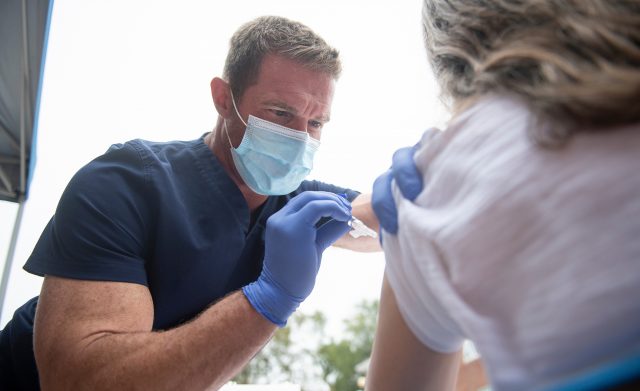
With a severe flu season predicted, health care providers at University Health Services are encouraging members of the university community to get a flu vaccine. Photo by Logan Kirkland/Ole Miss Digital Imaging Services
Fall at the University of Mississippi means new students, tailgating in the Grove and gearing up for the holidays. Unfortunately, it also means increased cases of the flu.
“We had such light flu seasons the past two years,” said Dr. Hubert Spears, staff physician at Employee Health Services. “I’d say so far this year, we’re starting off worse than we did pre-pandemic.”
Data from the Centers for Disease Control and Prevention confirms this. According to the CDC, early increases in seasonal influenza activity continue with the Southeast and south-central areas of the country reporting the highest levels of activity.
Besides typical preventative measures such as hand washing and avoiding contact with those who are sick, Spears strongly recommends that members of the university community get a flu vaccine. These are available at University Health Services, as well as other local providers.
“We know they are safe, and they are effective too,” Spears said. “They won’t prevent all cases, but the ones that they don’t prevent should be less serious.
“Every year, the World Health Organization analyzes data from that year’s flu season in the Southern Hemisphere to tailor the vaccine for the Northern Hemisphere. While not totally predictive of the Northern Hemisphere predominant strains, through the years, this process has produced effective vaccines.”
Surprisingly, vaccines for the flu are more complicated than those for COVID-19, Spears said.
“There are different recommendations for people over 65 and people who are immunocompromised than for the general population,” he said. “These categories need a high-dose quadrivalent vaccine, a standard-dose with an adjuvant or a recombinant vaccine.
“There is also the consideration of whether the patient has had an adverse reaction to an egg-based vaccine. If they have, they should receive the recombinant or non-egg-based cell culture vaccine. This points out the complexity of the decision.”
It takes about two weeks for immune responses to peak after getting the vaccine, Spears said. Typically, flu cases peak in February, but this year may be earlier because of decreased immunity in the population due to fewer cases over the last two years.
For those who contract the virus, staff at University Health Services can prescribe antivirals that will cut down the duration and severity of their illness.
“There are four different antivirals that have their advantages and disadvantages,” Spears said. “Tamiflu is our standard; it is covered by our employee insurance.”
Alex Langhart, director of University Health Services, said that his team puts a high priority on informing the university community about options when it comes to the flu.
“At University Health Services, we want our campus community to have the most up-to-date information on this year’s flu season and access to all available resources for prevention and treatment,” Langhart said. “Our focus is enhancing student, faculty and staff health and well-being.”